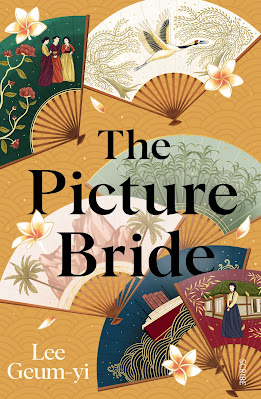 |
| Scribe 10 November 2022 My thanks to the publisher for my copy of this book |
Could you marry a man you’ve never met? Three Korean women in 1918 make a life-changing journey to Hawaii, where they will marry, having seen only photographs of their intended husbands.
Different fates await each of these women. Hong-ju, who dreams of a marriage of ‘natural love’, meets a man who looks twenty years older than his photograph; Song-hwa, who wants to escape from her life of ridicule as the granddaughter of a shaman, meets a lazy drunkard. And then there’s Willow, whose 26-year-old groom, Taewan, looks just like his image..
Real life doesn’t always resemble a picture, but there’s no going back. And while things don’t turn out quite as they’d hoped, even for Willow, they do find something that makes their journey worthwhile - each other.
I am delighted to be able to share an extract from The Picture Bride on today's blog tour stop
1
1917, OJIN VILLAGE
“Miss Willow,” the Pusan Ajimae said, “you’ll be eighteen next year, won’t you? What about going to Powa and getting married?”
At that, the eyes of Willow and her mother, Mrs. Yun, grew large. Although in fact she lived in Gupo, some miles away from Pusan, the “Pusan Ajimae” was a peddler who went about from village to village selling women’s things like camellia oil, face powder, combs, mirrors,haberdashery, and matches, from a bundle she carried on her head. She had been visiting Mrs.Yun’s family since she was a child. The Pusan Ajimae would visit Ojin Village once or twice a year, and al- ways open her bundle, sell her wares, and stay overnight at Willow’s house.
In the villages nestling in the valleys along the foot of Mae- bongsan Mountain, the sky was visible as if from the bottom of a well. Ojin, a small village of less than fifty households, was par- ticularly remote. In order to reach the closest market, at Jucheon, it was necessary to cross the crests of three hills. Therefore, the village women waited impatiently for a visit from the Pusan Ajimae. Among the items in her bundle, they rarely bought anything but packets of needles or some matches, all the other things being too expensive for them, but still they were a feast for the eyes. And hearing news of the outside world from the Pusan Ajimae, who journeyed all over the region, was a feast for the ears.
That evening, the women who had filled the room went back home, while Willow’s younger brothers Gwangsik and Chunsik went across to their room to sleep. As she unfolded the bedding, Willow eyed her mother for some reaction to the unexpected talk of her marriage. She had never heard of a place called Powa. The same was true for Mrs. Yun, for whom the name was un- familiar.
“Powa? Where’s that?”
Her mother’s expression was a combination of delight and anxiety. Willow knew the cause of her anxiety. No matter how good a marriage candidate the man might be, it was going to be difficult to find the money to prepare a new set of bedding to take as the bride’s contribution.
Before she was born, her father, Schoolmaster Kang, had nourished the ambition of passing the state examination, restoring the fortunes of his impoverished family, and transforming the corrupt world. On passing the first part of the exam, he was entitled to be called Chosi Kang, but then the examination system was abolished. There could be no greater disaster for Chosi Kang, who had been doing nothing but preparing for the exam. Not only was the paltry financial aid he had been receiving from his family cut off, but his father-in-law also went bankrupt and could not help. A yangban without an official position and without money was like a tasty-looking, rotten apricot.
Chosi Kang set up a scrivener’s office on the marketplace in order to earn a living, butthey were so poor that Mrs. Yun was obliged to earn money with her needle. Then wealthy Mr. An invited Chosi Kang to become the schoolmaster in Ojin Village.
Eight years ago, when Willow’s father passed away, a shadow like that of a mountain fell over her family home, even on clear days, together with a heavy silence. When the eldest son died two years later, the shadow over the house settled on her mother’s face.
“Well, it’s a bit far off. Have you ever heard of America?”
“I’ve heard of it,” Mrs. Yun replied. “The foreign pastor of Jucheon Church is an American. Is he from Powa?”
“Well, Powa is American land, but it seems it’s an island that they call ‘Hawaiʻi.’ If you go there, they say you can sweep up money with a dustpan. I’ve been told that clothes and shoes grow on the trees, you only have to pick them and put them on. The weather is wonderful, too. Every season is late springtime, so you don’t need winter clothes.”
The Pusan Ajimae’s face was looking more excited than when she was selling her merchandise.
“Outside of Paradise, can there be such a place?” Willow asked excitedly.
“Well, they say Hawaiʻi is a paradise. Once you go there, fortune will smile on you. If I were ten years younger, I might powder my face and get married myself.”
At the wrinkled old Pusan Ajimae’s words, Willow and her mother both laughed, and the atmosphere in the room, which had grown tense with talk of marriage, grew more relaxed.
“But are there men from Korea living there?” Mrs. Yun asked.
Willow was also curious.
“A decade or so ago, a large number of men from Korea went to work in Hawaiʻi. Now they’ve succeeded in life and want to find brides. One of my husband’s relatives living in Pusan sent their daughter to be married in Hawaiʻi. When she went, she left in tears but after five years, she’s helped them to buy land and build a house. And she felt it was too good to be enjoying life there alone, so she’s sent her brother photos of would-be husbands, men wanting a bride from Korea. He’s asked me to help find an especially good lady I know of. I even have ap hoto of the would-be bridegroom.”
The Pusan Ajimae pulled a picture from her bundle and held it out. Willow was bashful about looking directly at it, as if she were facing a real man. Instead, Mrs. Yun took it and examined it closely. Willow scrutinized her mother’s expression. She was curious to know what he looked like.
“Well, will he do as a son-in-law?” asked the Pusan Ajimae. “Does he look like a good man? He’s not only a good person, he’s a landowner who’s farming on a really large scale.”
On hearing that, the eyes of Mrs. Yun and Willow grew even larger.
“A landowner?” Mrs. Yun’s voice grew louder. “In the United States? While the Japanese are taking people’s land away from us, how could we become a landowner in a foreign country?”
It was the dream of everyone in Korea to farm their own land.
“That’s right. If you’re diligent, you can go to another country and purchase land. Why, you’re holding a picture of a man who did this, aren’t you? So, will you powder your face and set off?”
Mrs. Yun let the photo drop onto Willow’s skirt.
Willow shyly picked it up; her eyes were already gazing at the man in a suit. He had dark eyebrows, big, bright eyes, a straight nose, and a tightly closed mouth and seemed to be staring at her. Her face turned red. Willow’s heart began to race.
“On the back there’s his name and age.”
Willow flipped the photo over. On it was written in a neat hand, So Taewan, 26 years old. The name So Taewan was immediately imprinted on Willow’s heart.
There was nobody else around, but the Pusan Ajimae lowered her voice. “If he’s only twenty-six years old, that’s young. It seems most of the men in Hawaiʻi looking for brides are older.” “If it’s not a matter of a second marriage, what’s a nine year difference?” Mrs. Yun asked, indicating that she was half inclined to accept. “Where is his home and how large is his family?”
Willow’s eyes were fixed on the picture. Even if she liked him, he was too far away. Even if he lived close by, it would be hard for her to visit her home more than once or twice a year, but if she went to Hawaiʻi, she might never see her family again. She didn’t want to go that far,leaving her mother and younger brothers behind.
“His hometown is Yonggang in Pyongan-do, up in the north. His mother died a few years ago, his sisters are already married and living elsewhere in Korea. Father and son are the only remaining family. There will be no other family to care for. And just think, if you go there you’ll be able to go to school.”
Willow looked up. “Is . . . is that true?”
“Sure. The girl from our family was totally illiterate, but after arriving there she was able to study. Now she writes letters home, and she can speak English like an American.”
Willow’s heart pounded.
About the Author
Lee Geum-yi is a bestselling YA author in Korea. The Picture Bride is her debut adult novel, and her debut in the English language.
About the Translator
An Seon Jae has lived in Korea since 1980. He was born in Cornwall in 1942, and since 1969 has been a member of the Community of Taizé, where he is known as Brother Anthony. He has published some 50 volumes of translated Korean poetry, as well as translations of several Korean novels.
Twitter #ThePictureBride
@ScribeUKBooks


No comments:
Post a Comment
Thank you for taking the time to comment - Jaffareadstoo appreciates your interest.